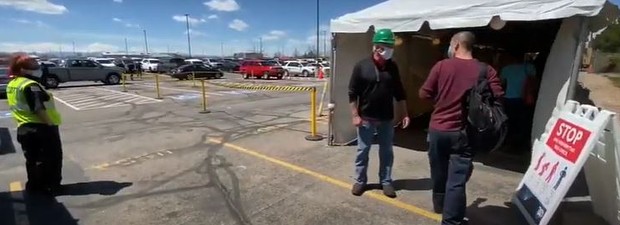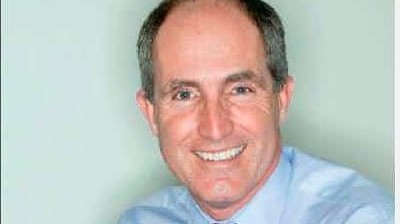The union representing workers at the JBS plant in Greeley said hundreds of absences in March were an unorganized response to infections there, whereas a previous version of this story incorrectly said the absences were a “walkoff.”

A screening station for employees entering the JBS USA beef facility in Greeley, Colo., as shown in a company-produced video about the JBS coronavirus response.
JBS USA
As a human tragedy unfolded at a meatpacking facility in Colorado’s Weld County in early April, the county’s chief health officer unwittingly found himself at the center of a coronavirus-driven storm that exemplifies the political, business and health priorities that bear on local officials in the eye of the pandemic, according to email correspondence seen by MarketWatch.
The health official, Mark Wallace, faced a barrage of questions and demands from sometimes competing interests including unions, business owners, state politicians and national media, the emails show.
In one early April email, after a TV station interviewed him about an outbreak at JBS USA, a Greeley, Colo.–based subsidiary of Brazil’s JBS S.A. JBSS3, +2.50%, Wallace wrote to the head of human resources at the meatpacking company: “They were not going to let up on me. ‘The cat’s out of the bag’ is what all health-care providers are saying — too many sick people already, too much spread already.”
That day would also mark the first plant-employee death in a coronavirus toll that would reach seven by May.
“ ‘Dr. Wallace is kind of our Dr. Fauci.’ ”
The internal Weld County emails, which were accessed via a series of Colorado Public Records Act requests, chronicle the fraught struggle to contain one of America’s most severe industrial coronavirus hot spots, and provide a case study into the country’s approach to the crisis, in which much of the responsibility for setting policy with regard to the pandemic and dealing with the fallout has landed on relatively low-level local officials whose decisions often have national implications.
Despite their national importance, these newly anointed field commanders remain at the mercy of the kinds of pressures that have always buffeted small-town bureaucrats.
“Dr. Wallace is kind of our Dr. Fauci,” said Rhonda Solis, a local school-board member and a spokesperson for the Latino Coalition of Weld County. “He’s dealing with people he has to report to. And I don’t know how much leeway Dr. Wallace gets.”

Dr. Mark Wallace.
Weld County Department of Public Health and Environment
The Weld County emails show Wallace pleading with elected officials for help with testing and other resources, while trying to nudge the meatpacking plant into protecting its workers. In the end, county officials rebuffed his desire for the level of county-supported testing and tracing he wanted, telling him his job was to help “open up” Weld County even in defiance of state shutdown orders. Meanwhile JBS addressed Wallace as an ally in a public-relations strategy aimed at countering worker claims that the company wasn’t doing enough to keep its workers from dying.
JBS and Weld County did not respond to requests for comment.
“They can be political hot seats, being a county health officer. I hate to say it, [but] you have to be able to walk away if it’s so toxic. If you’re unable to continue, you should stick by your principles,” said George Rutherford, a professor of epidemiology at the University of California, San Francisco.
Teresa Anselmo, executive director of the Colorado Association of Local Public Health Officials, said she’s been fielding calls from several chief health officers across the state who say they’re receiving threatening messages related to how they’re handling the pandemic. She expects to see a wave of resignations, she said.
Although chief health officers have the authority to close down a facility, their ability to exercise that power is dependent on cooperation with other state and county officials, including the sheriff’s office. Some health officials working in Colorado say that getting that kind of support has been difficult when different officials have differing views of the appropriate response to the pandemic.
“It’s an unconscionable position to put these professionals in,” said Anselmo. “They go into this profession to help people stay safe. Suddenly you throw them into a political quagmire, and it’s really unfair.”
On May 8, Weld County announced that Wallace had decided to leave his job at month’s end. “I am proud of the work I have done here,” the statement announcing his departure quoted him as saying.
Wallace declined to be interviewed for this story.
JBS has 4,590 full-time-equivalent workers in the Weld County seat of Greeley, where it is the largest employer. It donates significant sums to local charities, and many local residents have generations of friends and relatives who’ve been employed at the facility.
By March 30, at least 900 JBS employees in Greeley had been reported absent in what the union representing workers reportedly said was likely a mass, unorganized response to the company informing the plant of a number of coronavirus infections there. JBS officials downplayed the incident, saying the employees were likely absent for different, personal reasons.
On April 1, Wallace emailed a JBS official to say he was getting calls from area hospitals about a “quite large” number of plant workers reporting to emergency rooms, some of them needing to be put on ventilators.
“ ‘I feel like I got hit by a bus. These body aches are horrible. Not like flu body aches — much worse.’ ”
“Public health and the hospitals are quite concerned the numbers of sick people working at JBS are growing fast and could become unmanageable for the health systems in the region,” he wrote. “Their concern, and mine, is far too many employees must be working when sick and spreading infection to others.”
Crystal Rodriquez, a worker at the plant who contracted the disease, told MarketWatch, “I feel like I got hit by a bus. These body aches are horrible. Not like flu body aches — much worse.”
Rodriguez said her father — who was also a plant employee — barely survived after spending 12 days on a ventilator.
She described unclean work stations touched by hundreds of people, a lack of soap and hand cleaner, scarce personal protective gear, and “elbow-to-elbow working conditions, elbow-to-elbow seating in the cafeteria, bathroom areas as well are elbow-to-elbow, and people breathing down your neck standing in lines to get your equipment from the laundry and from the cafeteria.”
Wallace issued a public letter April 5 describing the more than 200 emergency-room visits by plant employees, and how two-thirds of JBS employees testing positive had reported to work even though they were sick.
Hospitals around the region reported patients describing a “work while sick” culture at the Greeley plant, Wallace wrote.
By this point, Wallace and his staff were working flat-out — sometimes 100-hour weeks — to help stanch the crisis, the emails show.
Wallace graduated in 1984 from the USC Keck School of Medicine and went on to work in Southern California hospitals. He has been a licenced Colorado physician since 1992 and joined the county health department in 1995, becoming its director in 2000.
On April 10, Wallace announced JBS had volunteered to temporarily close the plant for safety upgrades. That day, Wallace and his deputy received an email from Christopher Gaddis, human-resources director for JBS’s U.S. subsidiary, urging a coordinated public-relations strategy. “Team — As we work through the next few days, I would appreciate it if you would refrain from press interaction to the extent possible. It complicated operations on our end,” Gaddis wrote.
JBS issued a press release the same day saying it was working to secure testing for “all its team members” and that it had hired experts to help with protective measures such as work-station dividers. One of the experts enlisted by JBS, Mike Van Dyke, an associate professor in industrial hygiene at the University of Colorado, said the company was responsive to suggestions. However, Van Dyke also noted that JBS turned down the option of a report analyzing how the new safety measures had been set up.
The emails show JBS set up a testing site for managers, with coronavirus tests for rank-and-file workers to follow. Employees, advocates and state government officials subsequently said the company had refused to complete testing of its employees.
On April 12, Wallace sent a report to county commissioners stating that inmates who were employed at the plant on a work-release program required “focused testing” given that inmates from the county jail had been transferred to the hospital and put on ventilators. He also warned of an “additional surge” in cases as the infection spread throughout Weld County.
On April 17, JBS USA’s operations director emailed Wallace’s deputy saying the Washington Post and the New York Times were writing about the plant’s temporary closure. “I would like to give them something positive for their story so the national conversation does not falsely indicate we are at odds,” he wrote. “Anything you can do to get this up the chain quickly would be greatly appreciated.”
Wallace complied, offering up a quote saying he looked forward “to working in partnership to open the facility in a timely manner so this critical business can get back to work.”
On the morning of April 22, Wallace emailed the Weld County commissioners to explain that attempts to control the virus had been relatively ineffective and warned against reopening Weld County. Later in the day he begged for more testing to mitigate the risk of further infection.
“We expect case counts to go up but if we’re able to find people early, before they’ve spread it to others, we can get them back to work more quickly and avoid hospitalizations and [emergency room] visits,” he wrote. “Without testing we’ll have people spreading COVID-19 widely in the community and making things worse.”
That day Colorado produced a report showing 102 JBS workers infected with the disease, four of whom had died. That was twice as many staff deaths as at all other Colorado institutions combined, including nursing homes.
That evening Wallace got a rejection, followed by a request that he produce new “guidelines for businesses opening up.”
“When he told them to move slower, they blew him off,” said Mark Johnson, executive director at Jefferson County Public Health, in the Denver suburbs. “He was put in an untenable position. He could not do public health.”
In late April, the all-Republican Weld County commission defied state “Safer at Home” health orders by announcing it would institute a “Safer at Work” policy for reopening businesses, asking Wallace, in his words, to “lean in” to activities focused on reopening Weld County. The meatpacking plant reopened April 24.
As the death toll and infection rate continued following the plant’s reopening, Kim Cordova, leader of the union local representing workers at the plant, said in a radio interview that safety measures at the plant were incomplete because workers had not received training to run the processing line while keeping a safe distance from each other. “They opened the plant without any type of retraining,” Cordova said.
According to emails, the JBS plant continued working after the closure announcement to process carcasses already at the facility.
“Realistically they might have been shut down for six days,” said Deb Suniga, a Greeley community leader who has been fielding calls from JBS workers while also holding talks with state officials concerned about the determination to defy Colorado’s “Safer at Home” order among the Weld County commissioners. Wallace was “under their thumb,” Suniga said.
By May 1, infections among plant workers had risen to 245. Although JBS had said that it would test plant employees, Colorado’s governor said that the company had declined to actually test all the workers, and that the task would be left to the state to administer. The leader of the plant’s union said JBS had broken promises to provide sick leave, worker safety training and coronavirus testing, accusing the company of continued “reckless endangerment of the workers.”
By that time seven plant workers had died from the coronavirus.
Matt Smith reports for MarketWatch and Barron’s Group from San Francisco.










